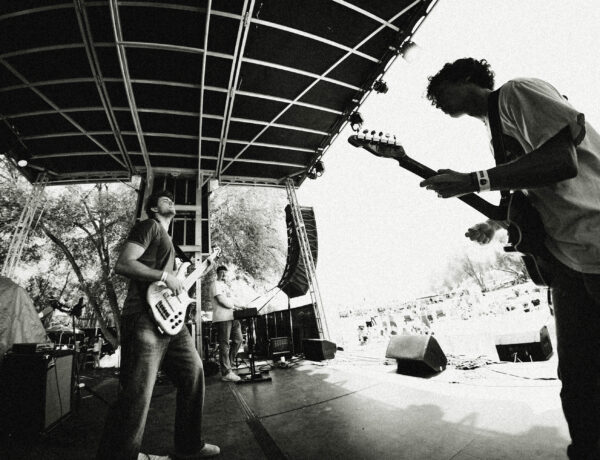The Used, ever since their debut in 2002, have been making waves in the music community. With their 6th studio album released last April, the gentlemen have progressed matured as adults as well as within their own writings. The Used have always been a band with something to say, but with Imaginary Enemy, they are making sure that their works are here to grab attention. This isn’t done in a “look at me” fashion, but rather the band’s choice to voice their concern that “the people” are not banding together when it comes to certain issues, whether political, social, or economic. Bassist Jeph Howard took a few minutes to comment on the band’s progress, their future, and what it means to be a live/organic band in today’s overly digitalized music industry.
Cliché: Revolution was written differently with you, Quinn, and Dan composing music to Bert’s vocals. What were the trials of this writing process?
Jeph Howard: We wrote a bunch of songs and those songs were scrapped, so we started over. We kind of had a bunch of guitar lines that were just there and the vocals were sung over the guitar lines. That’s kind of where the vocals started coming out first. There were no set guitar lines yet and then the melodies would follow. We would piece together the parts that we had wanted to record.
For me, it was cool and I had a good time doing it and I have to say that I had the best time I’ve ever had recording with this record. I know that I normally wouldn’t say that circumstantially, but I like jamming. I love having a guitar player right there and a drummer right there and a singer here. I like jamming as a band. I love playing with Dan’s beats.
This album has very minor touches of production, if any at all. Do you feel this is what helped The Used break back into their niche?
We’ve had a pretty much strong grip on the band since the beginning. Warner had a little bit of influence and a little bit of a push and there have been some things that were pretty shady, but overall as production goes, I would say that’s more of the producer.
We went with Feldman a lot and Feldman is big on production. I’m not very anti-production, but I don’t like a LOT of production. Slim is better. It’s kind of how we all feel as a band. We had to battle him for this. We fought to have less production and it is a good thing for Feldman because he likes to do things his way and I appreciate it, but we wanted to go more natural and more organic, more real. When you see a live band, that is the best kind of music. Recording bands are great, but the live band is the key. The more natural the record sounds then the better it sounds live.
I agree. If everything is digitalized and auto-tuned, you aren’t experiencing who the band is or their true sound. It’s almost like you are being lied to.
Yes! Or it is all computer tracks. I want to see someone make a mistake. I want to see the drummer screw up. I want to see the bass player screw up. That’s a live show. We screw up all the time. We actually make jokes about it. If you see someone pretending to play a flute on stage it is because someone screwed up. It happens every show, three or four times.
Imaginary Enemy is influenced heavily by the turmoil of humanity. Bert’s lyrics are intense and geared toward revolution. Was it complicated to write around these words? Do you all share the same opinions?
Revolution is a harsh word. Bert means it as a revolution of consciousness, which is aimed at humanity. I think that is the proper way to use that word. Standing up to fight is still fighting. To change, how do you change what is going on? I live in California, so let’s take that as an idea of what we are talking about. Look at the drought. They are putting so much pressure on the people who live there for water and to save water. “We need to make sure that we save water,” which is really good, but they are not putting pressure on the factory farms. Factory farms are using 90% of the water. So, the people who are using 10% of the water are getting so much grief, so much headache and pressure, but these factory farms… you can call them whatever you want, Satan or whatever, but they are evil. I use that lightly though. It’s using up food and resources. If you take that one little issue and change it, people will start to realize that they need to change these factory farms. That is sort of an idea on our view on revolution. That is what can make waves.
What I am voicing on what I think he means, not exactly what he means, but that you cannot stand around with petitions, fighting, to get money. Money doesn’t fight money. We need people to stand together. This record is about people standing together in unity and as a whole, as a community. I think people coming together is what really makes a difference. It’s easier said than done and people are going to get hurt. It’s going to have backlashes and it isn’t going to be easy.
The lyrical content of this album is influenced by Umberto Eco’s essay, Inventing the Enemy. In it, he notes that a nation is defined by their enemy rather than their companions. Aside from the nods towards this revolution we just spoke about, was this also a nod towards past labels?
I never thought about it that way. I haven’t read the essay and I know that Bert has been trying to get me to read it and I need to! I have so many books on the line and I am a very slow reader! [laughs] Bert references that a lot actually and he does it on stage a lot, too. He wants people to read it, so I should put that ahead of everything else that I am reading.
With labels, we didn’t have a hard time with Warner, really. We did okay with them and they treated us really well. There was some fucked up shit. Not going to lie, but we were with Warner for 10 years. That’s a long time. It went from the Internet starting to burn records, to all of a sudden, everyone was fired and there was only one person doing one job for 700 bands. How do you put any positive focus on any band when you have to take care of 700? We got lost in the mix there, but so did everyone else. Then we moved to Hopeless, but as a distribution only. They are great. I know we are mostly using them as a distribution like I said, but they care. They do charity work all the time and they are really great people. Nothing bad to say about them! We went from a big label to an indie label and actually got a better, positive deal.
You stated a little while ago that you weren’t impressed or inspired by today’s music. What is it about today’s music that is shallow of creativity in your view?
I don’t hate all music that comes out right now. There are a lot of bands coming out right now that are really good. The Marmozets, who we are on tour with, are incredible. They are one of the best bands I’ve ever heard. They have so much passion. They are one of those bands that you see live and go, “I want to be in a band!” That right there contradicts what I said about there not being any good bands out there. There are a lot of good bands, but also there is a lot of garbage. I don’t mean to be mean either. It’s the same thing with everything. Once something gets good, it gets filtered with a bunch of crap.
Back in the day—and I’m only talking from an American music standpoint here—you go to out of the country, there is SO much good music. Here, it’s kind of like, someone figures out a plan of how to do something and all of a sudden computers get involved that can map that same plan. You now can mass-produce bands through this computer machine and they all come out sounding the same and there is no backbone. There is no soul. I mean that in the music way as well. Look at soul music. Back in the day, when you saw gospel soul bands, their music would be like a slap in the face. You can still see those bands today, but what I mean is that is how The Marmozets are. Every Time I Die is like that, too. You’ll see! This tour, we are so lucky to be playing with everyone. Though, that is what I think is missing from some music today. There is no soul.
I hear a rumor that your writing is influenced by hip hop and Latin music?
Latin bass is incredible. I have never really tried playing Latin bass and I don’t know a lot of the idea of it, but what I really dig is Afro-Cuban, which has hip hop similarities to it. Anything with that back beat to it. Growing up, I was into hip hop and Latin music—I mean like REAL Latin music. There is this band Ojos de Brujo from Barcelona that is great. I think they broke up recently, but their bass player is out of control. Their backbeat is just… oh my god. I would say almost like hip hop-ish too with that twist of Latin.
Would you say that with the revolutionary themes of Imaginary Enemy that The Used has come full circle in where you all want to be?
I can see that. Right now we are definitely the most positive that we have ever been since the beginning. There is a drive in our band right now. I wouldn’t have been able to say that, years ago. That beginning with the first record that was about getting the fuck out and feeling trapped. The whole idea was that one that was there. That want and that same vise is there again, but even stronger. It makes me excited to record again. There is talk of a lot of things happening next year, but we are doing a 15-year thing next year. It’s going to be so crazy!
Read more Music Interviews on ClicheMag.com
Interview with Jeph Howard of The Used: Photographed by Heather Glock




